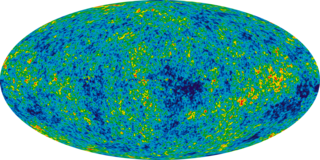
The Big Bang is a physical theory that describes how the universe expanded from an initial state of high density and temperature. The notion of an expanding universe was first scientifically originated by physicist Alexander Friedmann in 1922 with the mathematical derivation of the Friedmann equations. The earliest empirical observation of the notion of an expanding universe is known as Hubble's law, published in work by physicist Edwin Hubble in 1929, which discerned that galaxies are moving away from Earth at a rate that accelerates proportionally with distance. Independent of Friedmann's work, and independent of Hubble's observations, physicist Georges Lemaître proposed that the universe emerged from a "primeval atom" in 1931, introducing the modern notion of the Big Bang.
An epoch is an instant in time chosen as the origin of a particular calendar era.
Nemesis is a Greek mythological spirit of divine retribution against those who succumb to hubris.
Origin(s) or The Origin may refer to:
Singularity or singular point may refer to:
Bang or bangs may refer to:

The Big Bounce hypothesis is a cosmological model for the origin of the known universe. It was originally suggested as a phase of the cyclic model or oscillatory universe interpretation of the Big Bang, where the first cosmological event was the result of the collapse of a previous universe. It receded from serious consideration in the early 1980s after inflation theory emerged as a solution to the horizon problem, which had arisen from advances in observations revealing the large-scale structure of the universe.
A black hole is a region of extreme gravitational pull.
Dark Ages or Dark Age may refer to:
Armageddon is, according to the Bible, the site of a battle during the end times.
A supernova is an astronomical event, a type of stellar explosion.
A black box is a device, object, or system whose inner workings are unknown; only the "stimuli inputs" and "output reactions" are known characteristics.
Hindsight bias is the inclination to see past events as being predictable and reasonable.
Hellboy is a fictional character, created by writer-artist Mike Mignola.
M, or m, is the thirteenth letter of the English alphabet.

Since the emergence of the Big Bang theory as the dominant physical cosmological paradigm, there have been a variety of reactions by religious groups regarding its implications for religious cosmologies. Some accept the scientific evidence at face value, some seek to harmonize the Big Bang with their religious tenets, and some reject or ignore the evidence for the Big Bang theory.
A virus is a submicroscopic infectious agent that replicates only inside the living cells of an organism.
Thing or The Thing may refer to:
World history or history of the world may refer to:
This page is based on this
Wikipedia article Text is available under the
CC BY-SA 4.0 license; additional terms may apply.
Images, videos and audio are available under their respective licenses.

